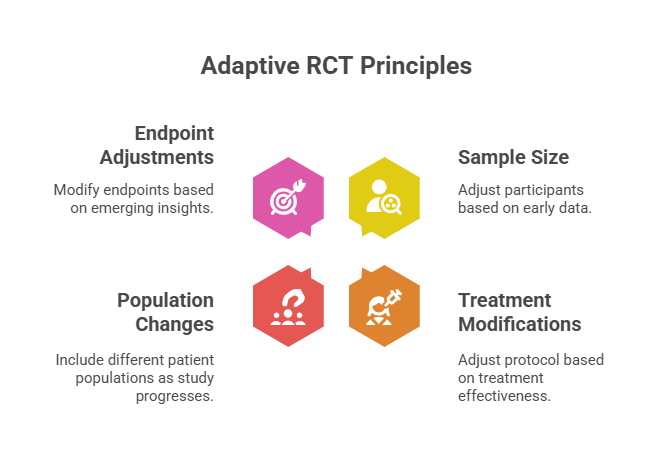Randomised controlled trials (RCTs) have long been the gold standard of clinical trials, with the most robust evidence of safety and effectiveness of new medicines. But the traditional RCT model—characterised by strict protocols, predetermined sample sizes, and rigid timelines—is now under attack for its inefficiencies, cost, and ethical implications.
In response, adaptive RCTs have become a game-changing strategy, allowing for adjustments to be made during the trial without sacrificing scientific integrity. Through the facilitation of data-driven changes in real time, adaptive RCTs are making trials smarter, quicker, and more ethical. This article delves into the complex world of adaptive trial designs, reviewing how adaptive trials are improving speed, efficiency, and patient safety and, in the process, redefining the future of clinical research.
The Evolution from Traditional to Adaptive Trial Designs
Traditional RCTs typically follow a linear trajectory: a preselected sample is recruited, interventions are administered, and outcomes are analysed only after the whole group has been studied. This rigid format, while scientifically rigorous, has long development periods and high resource use. Moreover, if preliminary data suggest futility or overwhelming effectiveness, the trial must nevertheless be concluded to its planned endpoint, which is ethically questionable in exposing the participants to inferior treatments or withholding beneficial therapy.
Adaptive RCTs are, however, designed on the basis of flexibility. Adaptive designs have pre-specified rules by which investigators can modify various aspects of the trial—e.g., sample size, randomisation ratios, dosing, or even patient eligibility criteria—based on interim analyses. Adaptive design leverages the data accumulating to make evidence-based decisions and reduce unnecessary patient exposure and accelerate the identification of successful treatments.
The Core Principles of Adaptive RCTs
Essentially, adaptive RCTs are characterized by flexibility, where trial parameters can be amendable to changes in line with interim results. The flexibility can be of varied types, including:

- Sample Size Reestimation: Researchers can adjust the number of participants based on early data analyses, ensuring that the trial is adequately powered to detect treatment effects.
- Treatment Modifications: If preliminary results indicate that a specific treatment is particularly effective or harmful, the trial protocol can be adjusted to either increase the allocation of participants to the beneficial treatment or halt the trial altogether.
- Population Changes: Adaptive designs can facilitate the inclusion of different patient populations as the study progresses, ensuring that findings are applicable to broader demographics.
- Endpoint Adjustments: Researchers can modify primary and secondary endpoints based on emerging insights, enhancing the relevance of the trial outcomes.
These standards not only increase the efficiency of clinical trials but place greater emphasis on protecting the safety of patients. Through the ability of researchers to respond quickly to new data, adaptive RCTs can reduce patient exposure to ineffective or harmful interventions, consistent with modern ethical standards for clinical research.
Enhancing Speed and Efficiency through Adaptivity
One of the most compelling advantages of adaptive RCTs is that they may shorten the duration of clinical trials by a considerable margin. Through continuous monitoring of interim results, adaptive trials may eliminate ineffective treatment arms ahead of schedule, concentrate resources on promising interventions, and adaptively adjust enrolment to optimize statistical power.
For instance, a landmark review by the U.S. Food and Drug Administration (FDA) cited the potential of adaptive clinical trials to reduce sample sizes by up to 30% and shorten trial duration by several months compared to fixed designs. Not only does this reduction accelerate the pace of innovation, but lower costs of development, too, which, the Tufts Center for the Study of Drug Development has determined, can cost upwards of $2.6 billion to bring a new drug to market.
The pandemic highlighted the utility of adaptive designs in emergency situations. Adaptive platform trials like the UK’s RECOVERY trial exemplified unprecedented speed and flexibility by simultaneously testing more than one treatment and quickly discarding non-effective arms. This method resulted in the early discovery of dexamethasone as a life-saving medicine for critically ill COVID-19 patients, saving thousands of lives globally.
Ethical Dimensions: Prioritizing Patient Safety and Scientific Integrity
Adaptive RCTs also address typical ethical concerns in clinical studies. Traditional trials subject people to inefficient or harmful therapies throughout the study, even if data collection reveals no benefit or unacceptable harm. Adaptive designs avoid these problems by providing an option for early stopping on the basis of futility or safety, thereby protecting participants from avoidable harm.
Furthermore, adaptive randomisation techniques can efficiently assign patients to better treatment arms as one learns more, without sacrificing trial validity and optimising treatment benefit to the patient. Adaptive allocation is patient-centred, which is more in accordance with ethical research principles of beneficence and justice.
Regulatory bodies like the FDA and the EMA have formally recognised these ethical benefits by publishing guidance documents that promote cautious execution of adaptive designs while strongly advocating cautious statistical planning and transparency.
Statistical Considerations and Methodological Rigor
As thrilling as they are, adaptive RCTs need to be designed well and have sound statistical methods to prevent bias and ensure validity. The resulting adaptivity with flexibility is challenging to control for type I error rates (false positives) and have adequate statistical power.
Statisticians utilise advanced techniques such as group sequential methods, Bayesian methods, and simulation-based designs in a bid to overcome such challenges. The techniques enable trialists to pre-specify rules of adaptation and rules of stopping so that any adaptation is scientifically sound and statistically sound.
In addition, the establishment of independent data monitoring committees (DMCs) needs to be instituted for monitoring interim analyses and protecting unbiased decision-making. The DMC examines cumulative data and advises changes, weighing sponsor, investigator, and patient interests.
Operational and Logistical Impacts
Adaptive RCTs also necessitate adaptive modifications in trial infrastructure and management. There is a necessity for real-time capture of data, quick statistical analysis, and responsive decision-making procedures. This necessitates sophisticated electronic data management systems, cross-functional coordination, and enhanced channels of communication among stakeholders.
Pharmaceutical companies and contract research organisations are investing more in adaptive trial platforms and training to build in-house skills. Even though such investment will increase initial costs, downstream efficiency and reduced trial failures are likely to yield high returns.
Real-World Applications of Adaptive RCTs
Recent practice examples of adaptive RCTs show the revolutionary potential of this method. In particular, the I-SPY 2 trial, designed to compare treatments for breast cancer, is an adaptive trial that has effectively implemented new techniques. The trial is designed to adapt in real time based on early results, allowing researchers to determine effective treatments earlier. Through the use of adaptive designs, the I-SPY 2 trial has greatly reduced patient recruitment times and assisted in developing personalised treatment approaches.
Moreover, the COVID-19 pandemic has accelerated the use of adaptive RCTs across many therapeutic fields. The RECOVERY trial, initiated in the UK, utilised an adaptive design to test several treatments against the COVID-19 disease. With the quick adaptation of the study to include new therapies, the RECOVERY trial has provided valuable information that has guided worldwide treatment policies.
Conclusion
Adaptive RCTs represent a design paradigm shift that is a more intelligent, quicker, and more ethically defensible path than traditional ones. Through a willingness to adapt in accordance with rigorous scientific principles, these trials optimise the productivity of drug development, ensure patient safety, and accelerate the discovery of new treatments.
Adaptive RCTs will redefine clinical trials in the face of shifting regulatory landscapes and advancing technology, influencing future medical innovation and enhancing health outcomes on a global scale. To meet the problems of modern medicine, it will be essential for research.




















